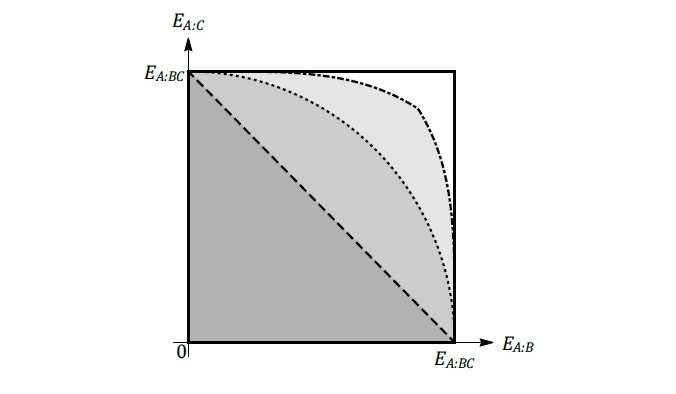August 2, 2016 report
Some types of quantum entanglement cannot be both monogamous and faithful

(Phys.org)—As might be expected, the terms "monogamous" and "faithful" mean something a little different in the quantum world than they do in everyday language. In a new paper, a collaboration of physicists and mathematicians have shown that, when quantified by a standard means, entanglement cannot be both monogamous and faithful at the same time. The results may be relevant when assessing the security of quantum cryptographic schemes, which rely on the monogamy of entanglement, and may also help to better understand the long-standing "firewall debate" related to the behavior of black holes.
The researchers, Cécilia Lancien et al., at institutions in Spain, France, Switzerland, and the UK, have published a paper on the monogamy of entanglement in a recent issue of Physical Review Letters.
In general, monogamy is considered to be a defining property of entanglement. In this context, monogamy means that, for example, if two quantum systems (such as two photons) are maximally entangled, then they are in a "pure" joint state, and neither system can be correlated with a third system. Although the monogamy property of entanglement is well-known, and is always valid in some precise qualitative sense, it has been challenging to quantitatively formalize the concept.
Now for the first time, Lancien et al. have quantitatively formalized the monogamy property of entanglement in the most general terms. This has led them to the somewhat surprising discovery that, when it comes to the quantification of entanglement through widely used entanglement measures, entanglement does not appear to be monogamous.
The quantum states involved in this entanglement "polygamy" pertain to systems that have high-dimensionality (systems that in principle can encode many bits of information) and that are in "mixed" rather than pure states.
The widely used measures of entanglement that violate monogamy do, however, obey another relevant property: they are "geometrically faithful." This means that they quantitatively capture the fact that entangled states are very different than unentangled states. In general, monogamous measures of entanglement do not have the property of being faithful.
"In the realm of quantum entanglement, you have to choose between monogamy and faithfulness," coauthor Andreas Winter at the Universitat Autonoma de Barcelona told Phys.org. "You cannot have both."
Investigating these results further, the researchers found a way to restore monogamy at the quantitative level by correcting for the high-dimensionality of the systems involved. They did this by taking into account dimensions in the equations that capture the notion of monogamy. The dimension-dependence suggests that the monogamy of high-dimensional physical systems in mixed states may be more tenuous than previously thought.
Overall, the results help to advance the understanding of how entanglement can be distributed among multiple quantum systems.
"Entanglement is at the core of quantum theory, and limitations in how it can be shared have both foundational consequences and applications in quantum technologies," said coauthor Marco Piani at the University of Strathclyde.
For instance, the general lack of monogamy may be considered a challenge for implementing quantum cryptography, whose unconditional security relies on the inability of an eavesdropper to become too correlated with the trusted parties. On the other hand, the lack of monogamy also offers some "wiggle room" that may help to understand puzzling black hole behaviors, which appear when trying to combine quantum mechanics with general relativity.
"Since monogamy is not fundamentally limiting entanglement in high-dimensional systems, this suggests that no burning firewall should appear at the event horizon of a black hole (although I wouldn't volunteer to test this prediction experimentally)," said coauthor Gerardo Adesso at the University of Nottingham. "Our results also open new perspectives to harness entanglement for information processing and communication technologies in multi-user scenarios."
More information: Cécilia Lancien et al. "Should Entanglement Measures be Monogamous or Faithful?" Physical Review Letters. DOI: 10.1103/PhysRevLett.117.060501. Also at arXiv:1604.02189 [quant-ph]
Journal information: Physical Review Letters
© 2016 Phys.org





















